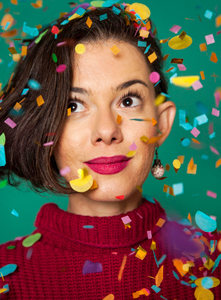I have always tried to advocate for myself, but I noticed from a very young age that I had difficulties doing so verbally. It takes a while for me to organize my thoughts to be able to speak, and I often say that even though my speaking and writing comes from the same brain, it seems like it’s coming from different people. Confrontation is also a hard task for me, even when I rehearse social interactions that might lead to it (which I often do). So, I found in writing, and later in visuals, a way to express myself, how I see the world, how to advocate for myself.

Izabelle Azevedo
I believe my advocacy journey reached a new level when I started sharing about mental health on social media, in 2018. Back then, I was feeling empty from depression, and felt like no one could understand what I was going through. But once I was writing about it, people who were going through something similar started to reach out. Suddenly I was no longer alone. Those folks reaching out would tell me about themselves, thank me for opening up that space for them, and say they no longer felt alone either. That is when I realized how powerful storytelling can be – so powerful that it can help heal both the one who’s sharing and the one who’s receiving the message.
If it wasn’t for those sharing their own stories, I don’t know if and when I would have found out I am autistic. I will be forever thankful to Alex Pearson and her TikToks that showed up to me on a random day in the Fall of 2020 and made me realize I could be on the spectrum. As an adult female who is empathetic, creative, and can communicate, at that time I certainly did not believe I could be autistic. It contradicted what I read about the “condition.” I had to hear from those with practical experience, and other neurodivergent females, to understand the differences in presentation, how good we are at masking, and that, yes, an autistic person can be highly empathetic and creative. Now my life makes sense. And again, I no longer feel alone.
I was officially diagnosed autistic and ADHD in August 2021, at the age of 34. I remember feeling a mix of relief and rage. What if I had known sooner? Would my life be different? I thought of all the women out there who were feeling like I was – broken but far from finding out that they aren’t broken. I took some time to process and grieve, and I promised myself I would use my storytelling skills to help raise awareness about autism in adults, especially in females.
Last April I finally shared my story with everyone, including family and friends. Since then, I started posting on LinkedIn about autism, ADHD in women, and neurodiversity. My posts are usually more than a point of view or quotes from an article. What I share is often personal because my goal is not only to inform, but to connect, and it is harder to accomplish that without being vulnerable. Storytelling has been a tool for human connection since the Stone Age, so I try to use it in my posts, even when I am sharing my point of view. And that is because I want to provoke some kind of reaction from my reader. Otherwise, I am not doing my job right.
Even though I keep talking about writing, and I do use writing more as a self-advocacy medium, I am actually a visual storyteller. I’ve been making videos (for other people) for a living since 2019, and I just finished my first semester of film school, having previously completed my 2-year associate degree. As you can see, storytelling is more than an advocacy tool and a passion for me. So, in November 2021 out of an impulse to enter into a film festival, I made my first short fiction film, Purple Heather. In this film, I share the story of a high school senior who finds out she is autistic. The story is heavily inspired by my own journey and I released it to the world last September on a YouTube channel I created with the intention to share more stories from and about us.
I truly believe in the power of storytelling as a tool to shape and change perspective. More than that, it can be and has been a tool for advocacy and healing for many folks out there, including myself. If we don’t share our stories, and if we don’t have others’ stories to relate to, how can we learn about ourselves and the world around us? For me in particular, it has truly been a big part of my self-acceptance and healing process, and I know that I am making a tiny but mighty impact in other people’s lives as well.
Izabelle’s work can be found at Cloudful.Tv and RedSkirtMedia.com. You can follow/contact her on LinkedIn.




